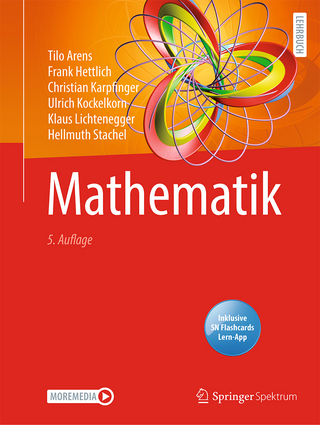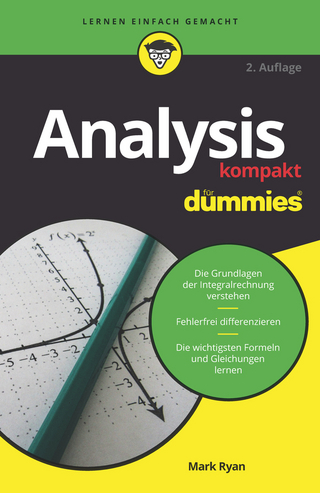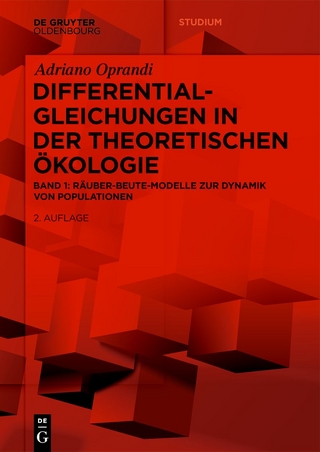
Convergence and Summability of Fourier Transforms and Hardy Spaces
Springer International Publishing (Verlag)
978-3-319-56813-3 (ISBN)
Ferenc Weisz is Professor at the Department of Numerical Analysis of the Eötvös Loránd University in Budapest, Hungary.
List of Figures.- Preface.- I One-dimensional Hardy spaces and Fourier transforms.- 1 One-dimensional Hardy spaces.- 1.1 The Lp spaces.- 1.2 Hardy-Littlewood maximal function.- 1.3 Schwartz functions.- 1.4 Tempered distributions and Hardy spaces.- 1.5 Inequalities with respect to Hardy spaces.- 1.6 Atomic decomposition.- 1.7 Interpolation between Hardy spaces.- 1.8 Bounded operators on Hardy spaces.- 2 One-dimensional Fourier transforms.- 2.1 Fourier transforms.- 2.2 Tempered distributions.- 2.3 Partial sums of Fourier series.- 2.4 Convergence of the inverse Fourier transform.- 2.5 Summability of one-dimensional Fourier transforms.- 2.6 Norm convergence of the summability means.- 2.7 Almost everywhere convergence of the summability means.- 2.8 Boundedness of the maximal operator.- 2.9 Convergence at Lebesgue points.- 2.10 Strong summability.- 2.11 Some summability methods.- II Multi-dimensional Hardy spaces and Fourier transforms.- 3 Multi-dimensional Hardy spaces.- 3.1 Multi-dimensional maximal functions.- 3.1.1 Hardy-Littlewood maximal functions.- 3.1.2 Strong maximal functions.- 3.2 Multi-dimensional tempered distributions and Hardy spaces.- 3.3 Inequalities with respect to multi-dimensional Hardy spaces.- 3.4 Atomic decompositions.- 3.4.1 Atomic decomposition of H2p (Rd).- 3.4.2 Atomic decomposition of Hp(Rd).- 3.5 Interpolation between multi-dimensional Hardy spaces.- 3.5.1 Interpolation between the H2p (Rd) spaces.- 3.5.2 Interpolation between the Hp(Rd) spaces.- 3.6 Bounded operators on multi-dimensional Hardy spaces.- 3.6.1 Bounded operators on H2p (Rd).- 3.6.2 Bounded operators on Hp(Rd).- 4 Multi-dimensional Fourier transforms.- 4.1 Fourier transforms.- 4.2 Multi-dimensional partial sums.- 4.3 Convergence of the inverse Fourier transform.- 4.4 Multi-dimensional Dirichlet kernels.- 4.4.1 Triangular Dirichlet kernels.- 4.4.2 Circular Dirichlet kernels.- 5 `q-summability of multi-dimensional Fourier transforms.- 5.1 The `-summability means.- 5.2 Norm convergence of the `q-summability means.- 5.2.1 Proof ofTheorem 5.2.1 for q = 1 and q = 1.- 5.2.1.1 Proof for q = 1 in the two-dimensional case.- 5.2.1.2 Proof for q = 1 in higher dimensions (d 3).- 5.2.1.3 Proof for q = 1 in the two-dimensional case.- 5.2.1.4 Proof for q = 1 in higher dimensions (d 3).- 5.2.2 Some summability methods.- 5.2.3 Further results for the Bochner-Riesz means.- 5.3 Almost everywhere convergence of the `q-summability means.- 5.3.1 Proof of Theorem 5.3.2.- 5.3.1.1 Proof for q = 1 in the two-dimensional case.- 5.3.1.2 Proof for q = 1 in higher dimensions (d 3).- 5.3.1.3 Proof for q = 1 in the two-dimensional case.- 5.3.1.4 Proof for q = 1 in higher dimensions (d 3).- 5.3.2 Proof of Theorem 5.3.3.- 5.3.3 Some summability methods.- 5.3.4 Further results for the Bochner-Riesz means.- 5.4 Convergence at Lebesgue points.- 5.4.1 Circular summability (q = 2).- 5.4.2 Cubic and triangular summability (q = 1 and q = 1).- 5.4.2.1 Proof of the results for q = 1 and d = 2.- 5.4.2.2 Proof of the results for q = 1 and d = 2.- 5.4.2.3 Proof of the results for q = 1 and d 3.- 5.4.2.4 Proof of the results for q = 1 and d 3.- 5.5 Proofs of the one-dimensional strong summability results.- 6 Rectangular summability of multi-dimensional Fourier transforms.- 6.1 Norm convergence of rectangular summability means.- 6.2 Almost everywhere restricted summability.- 6.3 Restricted convergence at Lebesgue points.- 6.4 Almost everywhere unrestricted summability.- 6.5 Unrestricted convergence at Lebesgue points.- Bibliography.- Index.- Notations.
| Erscheinungsdatum | 01.02.2018 |
|---|---|
| Reihe/Serie | Applied and Numerical Harmonic Analysis |
| Zusatzinfo | XXII, 435 p. 34 illus. |
| Verlagsort | Cham |
| Sprache | englisch |
| Maße | 155 x 235 mm |
| Gewicht | 847 g |
| Themenwelt | Mathematik / Informatik ► Mathematik ► Analysis |
| Schlagworte | Abstract harmonic analysis • atomic decomposition • Calculus & mathematical analysis • Calculus & mathematical analysis • circular, triangular and cubic summability • Complex analysis, complex variables • Fejér summability • Fejér summability • fourier analysis • Functional analysis & transforms • Functional analysis & transforms • Hardy-Littlewood maximal function • Hardy Spaces • Harmonic Analysis • Lebesgue points • Mathematics • mathematics and statistics • multi-dimensional summability • Sequences, Series, Summability • strong summability • theta-summability |
| ISBN-10 | 3-319-56813-2 / 3319568132 |
| ISBN-13 | 978-3-319-56813-3 / 9783319568133 |
| Zustand | Neuware |
| Informationen gemäß Produktsicherheitsverordnung (GPSR) | |
| Haben Sie eine Frage zum Produkt? |
aus dem Bereich


